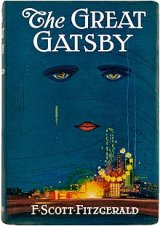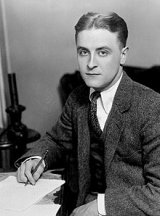The Great Gatsby Page #3
The Great Gatsby is a 1925 novel by American writer F. Scott Fitzgerald. Set in the Jazz Age on Long Island, near New York City, the novel depicts first-person narrator Nick Carraway's interactions with mysterious millionaire Jay Gatsby and Gatsby's obsession to reunite with his former lover, Daisy Buchanan. The novel was inspired by a youthful romance Fitzgerald had with socialite Ginevra King, and the riotous parties he attended on Long Island's North Shore in 1922
had. She hinted in a murmur that the surname of the balancing girl was Baker. (I’ve heard it said that Daisy’s murmur was only to make people lean toward her; an irrelevant criticism that made it no less charming.) At any rate, Miss Baker’s lips fluttered, she nodded at me almost imperceptibly, and then quickly tipped her head back again—the object she was balancing had obviously tottered a little and given her something of a fright. Again a sort of apology arose to my lips. Almost any exhibition of complete self-sufficiency draws a stunned tribute from me. I looked back at my cousin, who began to ask me questions in her low, thrilling voice. It was the kind of voice that the ear follows up and down, as if each speech is an arrangement of notes that will never be played again. Her face was sad and lovely with bright things in it, bright eyes and a bright passionate mouth, but there was an excitement in her voice that men who had cared for her found difficult to forget: a singing compulsion, a whispered “Listen,” a promise that she had done gay, exciting things just a while since and that there were gay, exciting things hovering in the next hour. I told her how I had stopped off in Chicago for a day on my way East, and how a dozen people had sent their love through me. “Do they miss me?” she cried ecstatically. “The whole town is desolate. All the cars have the left rear wheel painted black as a mourning wreath, and there’s a persistent wail all night along the north shore.” “How gorgeous! Let’s go back, Tom. Tomorrow!” Then she added irrelevantly: “You ought to see the baby.” “I’d like to.” “She’s asleep. She’s three years old. Haven’t you ever seen her?” “Never.” “Well, you ought to see her. She’s—” Tom Buchanan, who had been hovering restlessly about the room, stopped and rested his hand on my shoulder. “What you doing, Nick?” “I’m a bond man.” “Who with?” I told him. “Never heard of them,” he remarked decisively. This annoyed me. “You will,” I answered shortly. “You will if you stay in the East.” “Oh, I’ll stay in the East, don’t you worry,” he said, glancing at Daisy and then back at me, as if he were alert for something more. “I’d be a God damned fool to live anywhere else.” At this point Miss Baker said: “Absolutely!” with such suddenness that I started—it was the first word she had uttered since I came into the room. Evidently it surprised her as much as it did me, for she yawned and with a series of rapid, deft movements stood up into the room. “I’m stiff,” she complained, “I’ve been lying on that sofa for as long as I can remember.” “Don’t look at me,” Daisy retorted, “I’ve been trying to get you to New York all afternoon.” “No, thanks,” said Miss Baker to the four cocktails just in from the pantry. “I’m absolutely in training.” Her host looked at her incredulously. “You are!” He took down his drink as if it were a drop in the bottom of a glass. “How you ever get anything done is beyond me.” I looked at Miss Baker, wondering what it was she “got done.” I enjoyed looking at her. She was a slender, small-breasted girl, with an erect carriage, which she accentuated by throwing her body backward at the shoulders like a young cadet. Her grey sun-strained eyes looked back at me with polite reciprocal curiosity out of a wan, charming, discontented face. It occurred to me now that I had seen her, or a picture of her, somewhere before. “You live in West Egg,” she remarked contemptuously. “I know somebody there.” “I don’t know a single—” “You must know Gatsby.” “Gatsby?” demanded Daisy. “What Gatsby?” Before I could reply that he was my neighbour dinner was announced; wedging his tense arm imperatively under mine, Tom Buchanan compelled me from the room as though he were moving a checker to another square. Slenderly, languidly, their hands set lightly on their hips, the two young women preceded us out on to a rosy-coloured porch, open toward the sunset, where four candles flickered on the table in the diminished wind. “Why candles?” objected Daisy, frowning. She snapped them out with her fingers. “In two weeks it’ll be the longest day in the year.” She looked at us all radiantly. “Do you always watch for the longest day of the year and then miss it? I always watch for the longest day in the year and then miss it.” “We ought to plan something,” yawned Miss Baker, sitting down at the table as if she were getting into bed. “All right,” said Daisy. “What’ll we plan?” She turned to me helplessly: “What do people plan?” Before I could answer her eyes fastened with an awed expression on her little finger. “Look!” she complained; “I hurt it.” We all looked—the knuckle was black and blue. “You did it, Tom,” she said accusingly. “I know you didn’t mean to, but you did do it. That’s what I get for marrying a brute of a man, a great, big, hulking physical specimen of a—” “I hate that word ‘hulking,’ ” objected Tom crossly, “even in kidding.” “Hulking,” insisted Daisy. Sometimes she and Miss Baker talked at once, unobtrusively and with a bantering inconsequence that was never quite chatter, that was as cool as their white dresses and their impersonal eyes in the absence of all desire. They were here, and they accepted Tom and me, making only a polite pleasant effort to entertain or to be entertained. They knew that presently dinner would be over and a little later the evening too would be over and casually put away. It was sharply different from the West, where an evening was hurried from phase to phase towards its close, in a continually disappointed anticipation or else in sheer nervous dread of the moment itself. “You make me feel uncivilized, Daisy,” I confessed on my second glass of corky but rather impressive claret. “Can’t you talk about crops or something?” I meant nothing in particular by this remark, but it was taken up in an unexpected way. “Civilization’s going to pieces,” broke out Tom violently. “I’ve gotten to be a terrible pessimist about things. Have you read The Rise of the Coloured Empires by this man Goddard?” “Why, no,” I answered, rather surprised by his tone. “Well, it’s a fine book, and everybody ought to read it. The idea is if we don’t look out the white race will be—will be utterly submerged. It’s all scientific stuff; it’s been proved.” “Tom’s getting very profound,” said Daisy, with an expression of unthoughtful sadness. “He reads deep books with long words in them. What was that word we—” “Well, these books are all scientific,” insisted Tom, glancing at her impatiently. “This fellow has worked out the whole thing. It’s up to us, who are the dominant race, to watch out or these other races will have control of things.” “We’ve got to beat them down,” whispered Daisy, winking ferociously toward the fervent sun. “You ought to live in California—” began Miss Baker, but Tom interrupted her by shifting heavily in his chair. “This idea is that we’re Nordics. I am, and you are, and you are,
Translation
Translate and read this book in other languages:
Select another language:
- - Select -
- 简体中文 (Chinese - Simplified)
- 繁體中文 (Chinese - Traditional)
- Español (Spanish)
- Esperanto (Esperanto)
- 日本語 (Japanese)
- Português (Portuguese)
- Deutsch (German)
- العربية (Arabic)
- Français (French)
- Русский (Russian)
- ಕನ್ನಡ (Kannada)
- 한국어 (Korean)
- עברית (Hebrew)
- Gaeilge (Irish)
- Українська (Ukrainian)
- اردو (Urdu)
- Magyar (Hungarian)
- मानक हिन्दी (Hindi)
- Indonesia (Indonesian)
- Italiano (Italian)
- தமிழ் (Tamil)
- Türkçe (Turkish)
- తెలుగు (Telugu)
- ภาษาไทย (Thai)
- Tiếng Việt (Vietnamese)
- Čeština (Czech)
- Polski (Polish)
- Bahasa Indonesia (Indonesian)
- Românește (Romanian)
- Nederlands (Dutch)
- Ελληνικά (Greek)
- Latinum (Latin)
- Svenska (Swedish)
- Dansk (Danish)
- Suomi (Finnish)
- فارسی (Persian)
- ייִדיש (Yiddish)
- հայերեն (Armenian)
- Norsk (Norwegian)
- English (English)
Citation
Use the citation below to add this book to your bibliography:
Style:MLAChicagoAPA
"The Great Gatsby Books." Literature.com. STANDS4 LLC, 2025. Web. 22 Feb. 2025. <https://www.literature.com/book/the_great_gatsby_1598>.








Discuss this The Great Gatsby book with the community:
Report Comment
We're doing our best to make sure our content is useful, accurate and safe.
If by any chance you spot an inappropriate comment while navigating through our website please use this form to let us know, and we'll take care of it shortly.
Attachment
You need to be logged in to favorite.
Log In